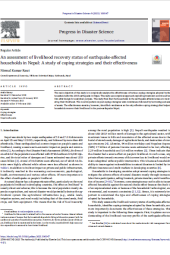An Assessment of Livelihood recovery Status of Earthquake-affected Households in Nepal: A Study of Coping Strategies and their Effectiveness
Summary
This is a research-based paper with the main objective of this study to empirically analyze the effectiveness of various coping strategies adopted by the household after the 2015 earthquake in Nepal. The study uses an empirical approach exploiting treatment control and before-after design for analytical purposes. The study finds that the households in the earthquake-affected areas are recovering their livelihood. The most important ex-post coping strategies were remittances followed by borrowing and sale of assets. The effectiveness exercise, however, identified remittances as the only effective coping strategy that helped households recover their livelihood in post-earthquake Nepal.
Categories:
Case Studies
Writer:
Nirmal Kumar Raut
Link Source:
DOI: 10.1016/j.pdisas.2021.100147
Publisher:
ELSEVIER (Progess in Disaster Science)
Published Year:
2021
